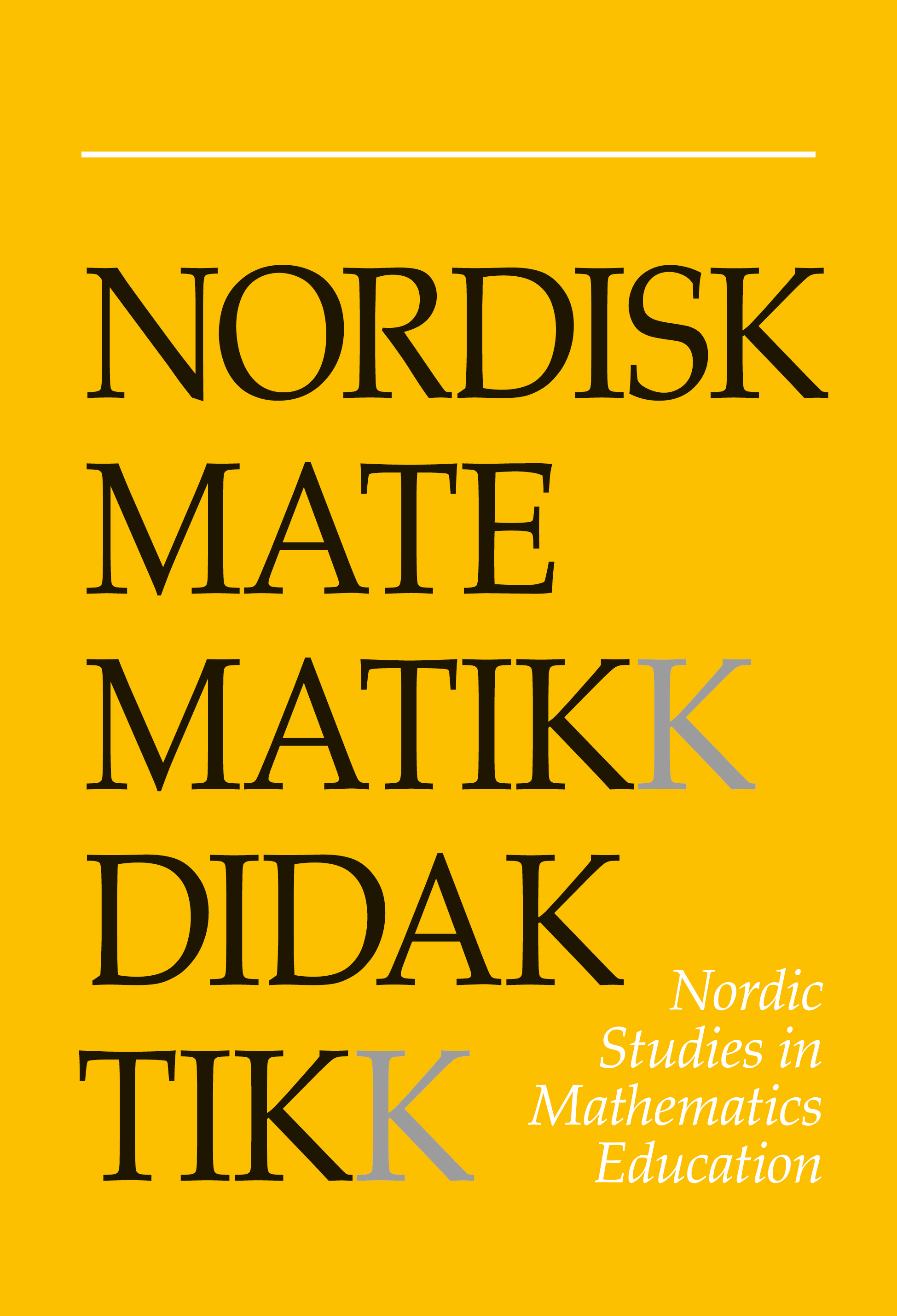Mediating activities in students’ collaborative work on self-explanation prompts
DOI:
https://doi.org/10.7146/nomad.v28i1-2.149254Abstract
This study concerns mediating activities in student discussions during collaborative work with self-explanation prompts (SEPs). While the aim of most other tasks, from the students’ perspective, can be perceived as finding the correct answer, discussions supported by SEPs require a different approach, because students must engage in mathematical discussions, and explain their insights into the mathematics at hand. In this study, we explore activities that are fostered by SEPs. The analysis of the activities taking place, reveal five mediating activities to promote in teaching, but also potential hinders for the intended discussion to occur.
References
Booth, J. L., Lange, K. E., Koedinger, K. R. & Newton, K. J. (2013). Using example problems to improve student learning in algebra: differentiating between correct and incorrect examples. Learning & Instruction, 25, 24-34. https://doi.org/10.1016/j.learninstruc.2012.11.002
Carlsen, M. (2010). Appropriating geometric series as a cultural tool: a study of student collaborative learning. Educational Studies in Mathematics, 74 (2), 95-116. https://doi.org/10.1007/s10649-010-9230-0
Cross, D. I. (2009). Creating optimal mathematics learning environments: combining argumentation and writing to enhance achievement. International Journal of Science and Mathematics Education, 7 (5), 905-930. https://doi.org/10.1007/s10763-008-9144-9
Dawes, L., Mercer, N. & Wegerif, R. (2003). Thinking together: a programme of activities for developing speaking, listening and thinking skills for children aged 8-11. Imaginative Minds.
Dyrvold, A. & Bergvall, I. (2019). Designing tasks with self-explanation prompts. In U. T. Jankvist, M. van den Heuvel-Panhuizen & M. Veldhuis (Eds.), Proceedings of CERME 11. Utrecht University. https://hal.science/hal-02423367/document
Genlott, A. A. & Grönlund, Å. (2016). Closing the gaps - improving literacy and mathematics by ict-enhanced collaboration. Computers & Education, 99, 68-80. https://doi.org/10.1016/j.compedu.2016.04.004
Große, C. S. & Renkl, A. (2007). Finding and fixing errors in worked examples: Can this foster learning outcomes? Learning & Instruction, 17 (6), 612-634. https://doi.org/10.1016/j.learninstruc.2007.09.008
Hsu, C. Y. & Tsai, C. C. (2013). Examining the effects of combining self-explanation principles with an educational game on learning science concepts. Interactive Learning Environments, 21 (2), 104-115. https://doi.org/10.1080/10494820.2012.705850
Jeannotte, D. & Kieran, C. (2017). A conceptual model of mathematical reasoning for school mathematics. Educational Studies in Mathematics, 96 (1), 1-16. https://doi.org/10.1007/s10649-017-9761-8
Kotsopoulos, D. & Lee, J. (2012). An analysis of math congress in an eighth grade classroom. Mathematical Thinking and Learning, 14 (3), 181-198. https://doi.org/10.1080/10986065.2012.682958
Kwon, K., Kumalasari, C. D. & Howland, J. L. (2011). Self-explanation prompts on problem-solving performance in an interactive learning environment. Journal of Interactive Online Learning, 10 (2), 96-112.
Langer-Osuna, J. M. (2016). The social construction of authority among peers and its implications for collaborative mathematics problem solving. Mathematical Thinking and Learning, 18 (2), 107-124. https://doi.org/10.1080/10986065.2016.1148529
McEldoon, K. L., Durkin, K. L. & Rittle-Johnson, B. (2013). Is self-explanation worth the time? A comparison to additional practice. British Journal of Educational Psychology, 83 (4), 615-632. https://doi.org/10.1111/j.2044-8279.2012.02083.x
Mercer, N. & Sams, C. (2006). Teaching children how to use language to solve maths problems. Language and Education, 20 (6), 507-528. https://doi.org/10.2167/le678.0
Mercer, N. & Littleton, K. (2007). Dialogue and the development of children's thinking: a sociocultural approach. Routledge. https://doi.org/10.4324/9780203946657
O'Connor, C., Michaels, S. & Chapin, S. (2015). "Scaling down" to explore the role of talk in learning: from district intervention to controlled classroom study. In L. Resnick, C. Asterhan & S. Clarke (Eds.), Socializing intelligence through academic talk and dialogue (pp. 111-126). AERA. https://doi.org/10.3102/978-0-935302-43-1_9
O'Connor, C., Michaels, S., Chapin, S. & Harbaugh, A. G. (2017). The silent and the vocal: participation and learning in whole-class discussion. Learning and Instruction, 48, 5-13. https://doi.org/10.1016/j.learninstruc.2016.11.003
Rittle-Johnson, B. & Alibali, M. W. (1999). Conceptual and procedural knowledge of mathematics: Does one lead to the other? Journal of Educational Psychology, 91 (1), 175-189. https://doi.org/10.1037/0022-0663.91.1.175
Rittle-Johnson, B., Loehr, A. M. & Durkin, K. (2017). Promoting self-explanation to improve mathematics learning: a meta-analysis and instructional design principles. ZDM, 49 (4), 599-611. https://doi.org/10.1007/s11858-017-0834-z
Roelle, J. & Berthold, K. (2013). The expertise reversal effect in prompting focused processing of instructional explanations. Instructional Science, 41 (4), 635-656. https://doi.org/10.1007/s11251-012-9247-0
Roelle, J., Berthold, K. & Renkl, A. (2014). Two instructional aids to optimise processing and learning from instructional explanations. Instructional Science, 42 (2), 207-228. https://doi.org/10.1007/s11251-013-9277-2
Smith, J.M. & Mancy, R. (2018). Exploring the relationship between metacognitive and collaborative talk during group mathematical problem-solving - What do we mean by collaborative metacognition? Research in Mathematics Education, 20 (1), 14-36. https://doi.org/10.1080/14794802.2017.1410215
Vygotsky, L. S. (1978). Mind in society: the development of higher psychological processes. Harvard University Press.
Vygotsky, L. S. (1986). Thought and language. MIT Press.
Wathne, U. & Carlsen, M. (2022). Third grade students' multimodal mathematical reasoning when collaboratively solving combinatorial problems in small groups. Mathematical Thinking and Learning [online]. https://doi.org/10.1080/10986065.2022.2099611
Watson, J. M. & Chick, H. L. (2001). Factors influencing the outcomes of collaborative mathematical problem solving: an introduction. Mathematical Thinking and Learning, 3 (2-3), 125-173. https://doi.org/10.1080/10986065.2001.9679971
Webb, N. M., Franke, M. L., Johnson, N. C., Ing, M. & Zimmerman, J. (2021). Learning through explaining and engaging with others' mathematical ideas. Mathematical Thinking and Learning. https://doi.org/10.1080/10986065.2021.1990744
Wertsch, J. V. (1985). Vygotsky and the social formation of mind. Harvard University Press.
Wertsch, J. V. (1993). Voices of the mind: a sociocultural approach to mediated action. Harvard University Press. https://doi.org/10.4159/9780674045101
Zack, V. & Graves, B. (2001). Making mathematical meaning through dialogue: "once you think of it, the Z minus three seems pretty weird". Educational Studies in Mathematics, 46 (1/3), 229-271. https://doi.org/10.1023/A:1014045408753
Downloads
Published
How to Cite
Issue
Section
License

This work is licensed under a Creative Commons Attribution-NonCommercial-ShareAlike 4.0 International License.



